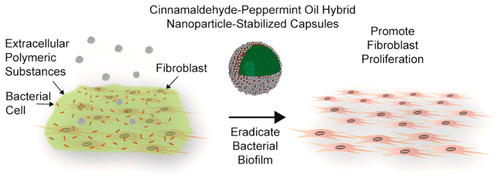Peppermint oil and cinnamon could help treat and heal chronic wounds

Infectious colonies of bacteria called biofilms that develop on chronic wounds and medical devices can cause serious health problems and are tough to treat. But now scientists have found a way to package antimicrobial compounds from peppermint and cinnamon in tiny capsules that can both kill biofilms and actively promote healing. The researchers say the new material, reported in the journal ACS Nano, could be used as a topical antibacterial treatment and disinfectant.
Many bacteria clump together in sticky plaques in a way that makes them difficult to eliminate with traditional antibiotics. Doctors sometimes recommend cutting out infected tissues. This approach is costly, however, and because it's invasive, many patients opt out of treatment altogether. Essential oils and other natural compounds have emerged recently as alternative substances that can get rid of pathogenic bacteria, but researchers have had a hard time translating their antibacterial activity into treatments. Vincent M. Rotello and colleagues wanted to address this challenge.
The researchers packaged peppermint oil and cinnamaldehyde, the compound in cinnamon responsible for its flavor and aroma, into silica nanoparticles. The microcapsule treatment was effective against four different types of bacteria, including one antibiotic-resistant strain. It also promoted the growth of fibroblasts, a cell type that is important in wound healing.
More information: Nanoparticle-Stabilized Capsules for the Treatment of Bacterial Biofilms, ACS Nano, Article ASAP. DOI: 10.1021/acsnano.5b01696
Abstract
Bacterial biofilms are widely associated with persistent infections. High resistance to conventional antibiotics and prevalent virulence makes eliminating these bacterial communities challenging therapeutic targets. We describe here the fabrication of a nanoparticle-stabilized capsule with a multicomponent core for the treatment of biofilms. The peppermint oil and cinnamaldehyde combination that comprises the core of the capsules act as potent antimicrobial agents. An in situ reaction at the oil/water interface between the nanoparticles and cinnamaldehyde structurally augments the capsules to efficiently deliver the essential oil payloads, effectively eradicating biofilms of clinically isolated pathogenic bacteria strains. In contrast to their antimicrobial action, the capsules selectively promoted fibroblast proliferation in a mixed bacteria/mammalian cell system making them promising for wound healing applications.
Journal information: ACS Nano
Provided by American Chemical Society
















